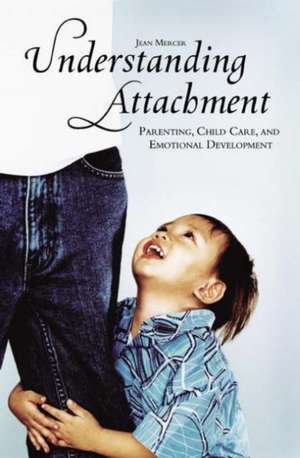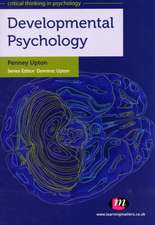Understanding Attachment: Parenting, Child Care, and Emotional Development
Autor Jean Merceren Limba Engleză Hardback – 29 noi 2005 – vârsta până la 17 ani
Preț: 355.15 lei
Preț vechi: 481.28 lei
-26% Nou
Puncte Express: 533
Preț estimativ în valută:
67.96€ • 71.15$ • 56.37£
67.96€ • 71.15$ • 56.37£
Carte tipărită la comandă
Livrare economică 09-23 aprilie
Preluare comenzi: 021 569.72.76
Specificații
ISBN-13: 9780275982171
ISBN-10: 0275982173
Pagini: 208
Dimensiuni: 156 x 235 x 6 mm
Greutate: 0.48 kg
Editura: Bloomsbury Publishing
Colecția Praeger
Locul publicării:New York, United States
ISBN-10: 0275982173
Pagini: 208
Dimensiuni: 156 x 235 x 6 mm
Greutate: 0.48 kg
Editura: Bloomsbury Publishing
Colecția Praeger
Locul publicării:New York, United States
Notă biografică
Jean Mercer is Professor of Psychology in the Division of Social and Behavioral Sciences at Richard Stockton College and President of the New Jersey Association for Infant Mental Health. She is also co-author of Attachment Therapy On Trial (Praeger, 2003).
Cuprins
Preface1 What Is Attachment? The Study of Emotional Ties2 Babies, History, War, and Politics: Early Work on the Attachment Concept3 The Growth of Attachment Theory: Connecting Ideas through Research4 Attachment, Age, and Change: Emotional Ties from Birth to Parenthood5 Families, Experiences, and Outcomes: What Difference Does Attachment History Make?6 Attachment, Mental Health, and Psychotherapy: Emotional Ties and Emotional Disturbance7 What Everybody Knows: Popular Views of Attachment8 New Directions: Parents, Children, and Attachment ConceptsNotesBibliographyIndex
Recenzii
A useful companion to Mercer's Attachment Therapy on Trial, written with Larry Sarner and Linda Rosa with Gerard Costa (CH, Dec'03, 41-2488), this book will be especially valuable for those unfamiliar with attachment theory and research. Mercer provides a concise and jargon-free summary of attachment theory and successfully reveals how developments in the assessment of attachment promoted the evolution of attachment theory to what it is today..Recommended. Lower-/upper-division undergraduates; technical students; practitioners; general readers.
Secure attachments are a matter of both nature and nurture, the individual and the environment. Some of the most nurturing parents in the world will have insecure children, and some secure children will survive the most erratic and troubled parents. That said, Mercer's recommendations for creating attachment-friendly daycare practices and interventions, based on the child's changing developmental needs, are sensible. Attachment, like grass, will emerge through even the tiniest of cracks. Whether we then water those tendrils or trample on them is our choice.
Secure attachments are a matter of both nature and nurture, the individual and the environment. Some of the most nurturing parents in the world will have insecure children, and some secure children will survive the most erratic and troubled parents. That said, Mercer's recommendations for creating attachment-friendly daycare practices and interventions, based on the child's changing developmental needs, are sensible. Attachment, like grass, will emerge through even the tiniest of cracks. Whether we then water those tendrils or trample on them is our choice.




